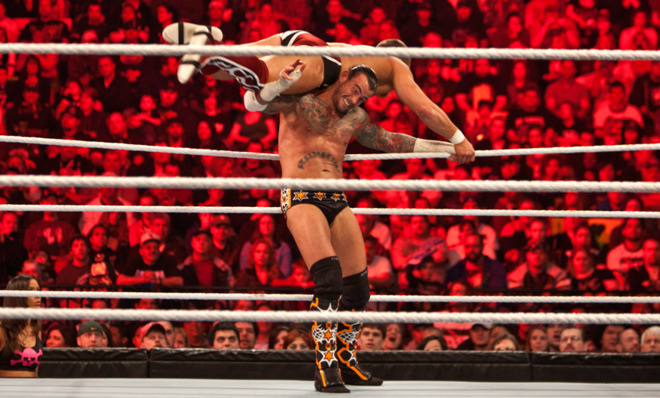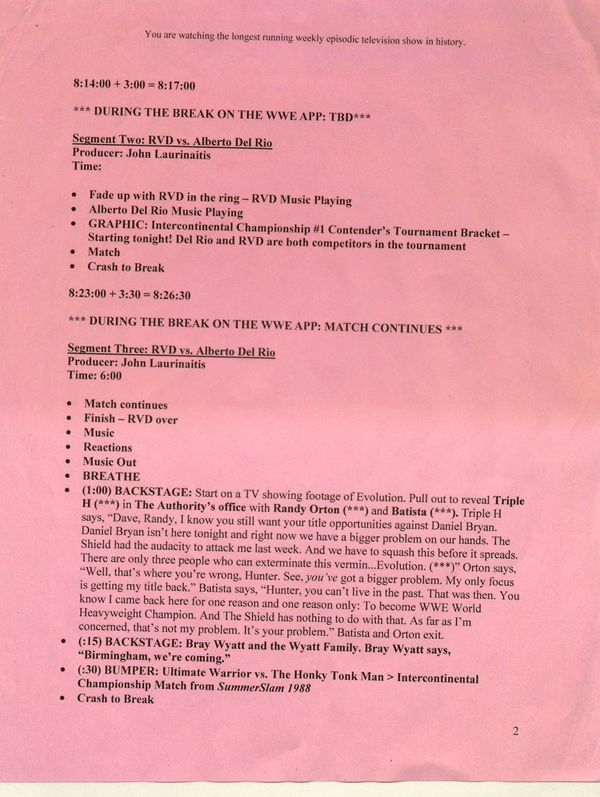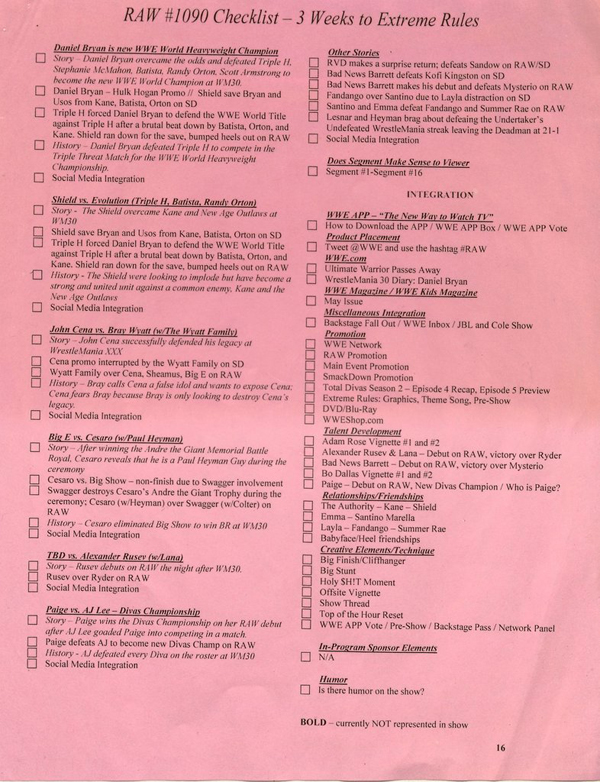Here's what a pro-wrestling script looks like
Pulling away the fig leaf of kayfabe


A free daily email with the biggest news stories of the day – and the best features from TheWeek.com
You are now subscribed
Your newsletter sign-up was successful
The WWE has an NSA problem. Someone is leaking scripts from backstage at the nation's largest sports entertainment company, and it is really pissing off the company's principal owner, Stephanie McMahon. As it should. Even though wrestling's staginess is now openly celebrated, the company has to keep a fig-leaf of kayfabe over their goods, if only for the sake of mystery and history.
Reading through the script is fascinating if you've ever wondered how the hetero-flexible male soap opera is put together. For one thing, the play-by-play of the matches themselves, i.e. the wrestling, are not included in the TV script. Instead, the actual matches are denoted by a single line, "Match." And then, referring to the series of moves and maneuvers that end the match, there's "the finish."
Isn't wrestling scripted? Well, here's the interesting thing: The wrestlers themselves, along with the match's segment producer, usually a former wrestler, may plan out the rough sequence of events in advance. But only the rough sequence of events. Pro wrestlers are masters of physical improv. They don't have time to write out and rehearse every body slam, clothesline, and Irish whip. In some cases, the two wrestlers will know who's supposed to win, how long the match is supposed to take, and then plan out with their opponent the sequence of three or four moves that will make the finishing montage, ending with the pin (1-2-3), the count-out, the disqualification, or general mayhem.
The Week
Escape your echo chamber. Get the facts behind the news, plus analysis from multiple perspectives.

Sign up for The Week's Free Newsletters
From our morning news briefing to a weekly Good News Newsletter, get the best of The Week delivered directly to your inbox.
From our morning news briefing to a weekly Good News Newsletter, get the best of The Week delivered directly to your inbox.
What IS heavily scripted is the storyline. The wrestlers must weave into their matches the themes and angles that their characters are following. That means that matches aren't random. If it's a romance angle and there's a girl at the ringside, the wrestler has to pine at the dame during the match. The cameras have to be ready to catch the pining. The announcers have to be ready to notice it and yammer about it. And so that pine is scripted.
In the old days, wrestlers would meet, and fans would be interested in knowing who wins and how. There were stories, but there were also plain old matches. Now, there are writers. Every match, every encounter, is designed to advance a character. And all the matches fit in to the general theme of the broadcast, which is given a title. For last week's Raw, the backstage title was "The Evolution of Justice." It's a reference to two sets of wrestlers who are on a collision course.
Your WWE wrestling script begins with background: What happened the last time WWE played to this area. Knowing what the fans remember is very important motivation for the wrestlers.
Then there are the "dark matches." Before WWE Raw goes live on the USA Network, WWE tapes two matches that will air exclusively on the company's own TV network.
A free daily email with the biggest news stories of the day – and the best features from TheWeek.com
Then there's the audience prep. Just like any TV show, the audience has to be conditioned to react to certain things. On April 14, WWE was going to mourn the death of the Ultimate Warrior, felled from a heart attack a few days before. So WWE announcer Jerry Lawler, who gets his own pre-event, full-stage introduction, is instructed to remind fans to put on their masks so that WWE can go live on the air with a tribute.
Then comes the first match. It'll be interrupted by a commercial break, which is something that the wrestlers know — they can't decide to go to "the finish" when the TV audience is watching a Pringles commercial. Match number one is between Rob Van Dam and Alberto Del Rio. Of the action, the script simply says this (click and zoom to enlarge):

The announcers know who will get "over," i.e. win, but they don't know how. This allows them to actually announce the action in the match legitimately.
The next segment takes us backstage. WWE executive vice president Paul "Triple H" Levesque has a live and entirely scripted-to-the-letter encounter with two other wrestlers. "Dave, Randy, I know you still want your title opportunity against Daniel Bryan. Daniel Bryan isn't here tonight. And now we have even bigger problem on our hands. The Shield had the audacity to attack me last week..."
And on we go. (Imagine the writer deciding between "gall" and "audacity.")
Page 16 of the script includes a checklist. Each element on the list must be mentioned and reinforced on the broadcast that night. In the case of this storyline, it must be noted that:
The Shield overcame Kane and New Age Outlaws at [Wrestlemania] 30.
Shield Save Bryan and Usos from Kane, Batista, and Orton on [Smackdown.] [This is the "attack" referred to above.]
Triple H forced Daniel Bryan to defend the WWE Title against Triple H after a brutal beatdown by Batista, Orton, and Kane.
Shield ran down for the save, bumped heels on Raw.
History: The Shield were looking to implode but became united against a common enemy.
Here's page 16 in full (click and zoom to enlarge):

Wrestling unions always have a lot of internal drama, so units like The Shield often do implode or explode, in order to advance the story.
The check list also includes a few mainstays. Every show needs to have a Holy Sh!T moment — so-called because the fans chant "Holy shit!" after seeing it. That's usually a major "bump," or a spot where a wrestler takes a particularly hard, gnarly, or creative hit.
And: "Is there humor on tonight's show?"
There is of course ample attention paid to social media integration, to character development, and to event promotion, too.
Marc Ambinder is TheWeek.com's editor-at-large. He is the author, with D.B. Grady, of The Command and Deep State: Inside the Government Secrecy Industry. Marc is also a contributing editor for The Atlantic and GQ. Formerly, he served as White House correspondent for National Journal, chief political consultant for CBS News, and politics editor at The Atlantic. Marc is a 2001 graduate of Harvard. He is married to Michael Park, a corporate strategy consultant, and lives in Los Angeles.
-
 Are Big Tech firms the new tobacco companies?
Are Big Tech firms the new tobacco companies?Today’s Big Question Trial will determine if Meta, YouTube designed addictive products
-
 El Paso airspace closure tied to FAA-Pentagon standoff
El Paso airspace closure tied to FAA-Pentagon standoffSpeed Read The closure in the Texas border city stemmed from disagreements between the Federal Aviation Administration and Pentagon officials over drone-related tests
-
 Political cartoons for February 12
Political cartoons for February 12Cartoons Thursday's political cartoons include a Pam Bondi performance, Ghislaine Maxwell on tour, and ICE detention facilities
-
 Walter Isaacson's 'Elon Musk' can 'scarcely contain its subject'
Walter Isaacson's 'Elon Musk' can 'scarcely contain its subject'The latest biography on the elusive tech mogul is causing a stir among critics
-
 Welcome to the new TheWeek.com!
Welcome to the new TheWeek.com!The Explainer Please allow us to reintroduce ourselves
-
 The Oscars finale was a heartless disaster
The Oscars finale was a heartless disasterThe Explainer A calculated attempt at emotional manipulation goes very wrong
-
 Most awkward awards show ever?
Most awkward awards show ever?The Explainer The best, worst, and most shocking moments from a chaotic Golden Globes
-
 The possible silver lining to the Warner Bros. deal
The possible silver lining to the Warner Bros. dealThe Explainer Could what's terrible for theaters be good for creators?
-
 Jeffrey Wright is the new 'narrator voice'
Jeffrey Wright is the new 'narrator voice'The Explainer Move over, Sam Elliott and Morgan Freeman
-
 This week's literary events are the biggest award shows of 2020
This week's literary events are the biggest award shows of 2020feature So long, Oscar. Hello, Booker.
-
 What She Dies Tomorrow can teach us about our unshakable obsession with mortality
What She Dies Tomorrow can teach us about our unshakable obsession with mortalityThe Explainer This film isn't about the pandemic. But it can help viewers confront their fears about death.
